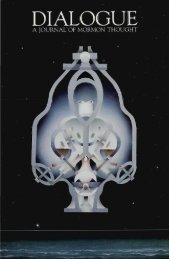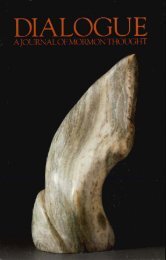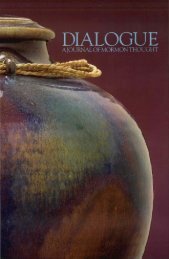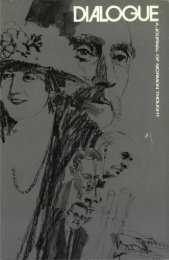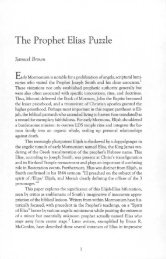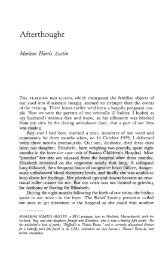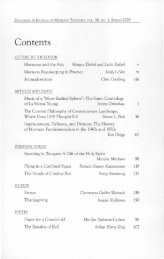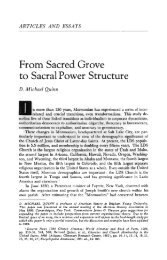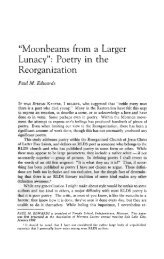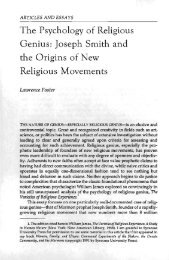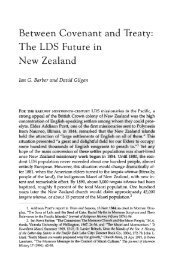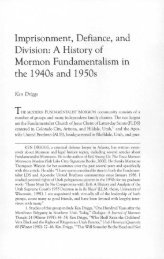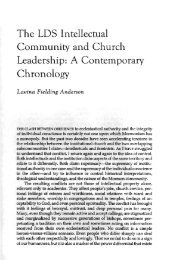Dialogue, Volume 25, Number 2 - Dialogue – A Journal of Mormon ...
Dialogue, Volume 25, Number 2 - Dialogue – A Journal of Mormon ...
Dialogue, Volume 25, Number 2 - Dialogue – A Journal of Mormon ...
You also want an ePaper? Increase the reach of your titles
YUMPU automatically turns print PDFs into web optimized ePapers that Google loves.
REVIEWS 175<br />
close to my face. Stroking her hair. Keeping<br />
ice on the back <strong>of</strong> her neck. She is so<br />
uncomfortable. We are trying to work with<br />
the pain. (p. 157)<br />
"You still don't understand, do you?"<br />
Mother said to me. "It doesn't matter how<br />
much time I have left. All we have is now.<br />
I wish you could all accept that and let go<br />
<strong>of</strong> your projections. Just let me live so I<br />
can die. . . . To keep hoping for life in the<br />
midst <strong>of</strong> letting go is to rob me <strong>of</strong> the<br />
moment I am in. .. . " Her words cut<br />
through me like broken glass, (p. 161)<br />
She starts to sob. I hold her as we rock<br />
back and forth on the stairwell, (p. 205)<br />
She rubbed my back. "I love you so.<br />
We don't need words, do we? Do you know<br />
how wonderful it is to be perfectly honest<br />
with your daughter? Do you know how rich<br />
you have made my life?" (p. 221)<br />
I walk back into her room, kneel at her<br />
bedside, and with bowed head and folded<br />
arms, I sob. I tell her I can no longer be<br />
strong in her presence. I tell her how agonizing<br />
this has been, how helpless I have<br />
felt, how much I hurt for her, for all that<br />
she has had to endure. I tell her how much<br />
I love her and how desperately I will miss<br />
her, that she has not only given me a reverence<br />
for life, but a reverence for death. /<br />
I cry out from my soul, burying my head<br />
in the quilt that covers her. / I feel my<br />
mother's hand gently stroking the top <strong>of</strong><br />
my head. (p. 226)<br />
Our eyes met. Death eyes. I looked into<br />
them, eyes wide with knowledge, unblinking,<br />
objective eyes. Eyes detached from the<br />
soul. Eyes turned inward. ... I took her<br />
right hand in mine and whispered, "Okay,<br />
Mother, let's do it. . . . " / I began breathing<br />
with her. It began simply as a mirroring<br />
<strong>of</strong> her breath. .. . Mother and I became<br />
one. One breathing organism.<br />
Everything we had ever shared in our lives<br />
manifested itself in this moment, in each<br />
breath. Here and now. (p. 230)<br />
Where is the Motherbody? . . . My<br />
physical mother is gone. My spiritual<br />
mother remains. I am a woman rewriting<br />
my genealogy, (pp. 240-41)<br />
All this.<br />
Diane had planted marigolds, just as<br />
she did each springtime, when her journey<br />
toward unnatural death began. After<br />
her mother's death, Terry and her husband,<br />
Brooke, are in Mexico for the Day<br />
<strong>of</strong> the Dead, el Dia de los Muertos. Terry<br />
buys marigolds from an old woman<br />
"whose arms were wide with [them]....<br />
'Gracias,' I say to her. 'This is the flower<br />
my mother planted each spring' " (pp.<br />
278-79).<br />
Full circle. Back in Utah, canoeing<br />
toward Antelope Island, Terry strews<br />
marigold petals into the Great Salt Lake,<br />
her "basin <strong>of</strong> tears," her "refuge."<br />
This book is simply beautiful and complexly<br />
beautiful as well. Only a few things<br />
mar the book's near perfection, and I feel<br />
crotchety and school-marmish and out <strong>of</strong><br />
linguistic fashion to mention them. I do<br />
so because I think Williams deserves more<br />
careful editing. To list a few <strong>of</strong> the most<br />
egregious errors, the necessary distinction<br />
between "lie" and "lay" (pp. 29 and 113),<br />
between "counsel" and "council" (p. 239),<br />
questions <strong>of</strong> agreement (p. 134), use <strong>of</strong><br />
the passive voice when the subject<br />
requires the strength <strong>of</strong> the active voice<br />
(p. 173), or accuracy in quoting sources<br />
(p. 90). For me these are like pimples on<br />
a beautiful face. And if you think errors<br />
don't matter, consider the glitch in the<br />
author's blurb in the journal wherein her<br />
now famous Epilogue to Refuge, "Clan <strong>of</strong><br />
the One-Breasted Women," appeared:<br />
"[Terry Tempest Williams] is currently<br />
working on a book entitled Refuse [sic], to<br />
be published by Viking next year." Little<br />
things do matter. "Refuse." Hmpf.<br />
BIBLIOGRAPHY<br />
Bradford, Mary Lythgoe. Leaving Home.<br />
Salt Lake City: Signature Books, 1987.<br />
de Beauvoir, Simone. A Very Easy Death,<br />
trans, by Patrick O'Brian. New York:<br />
Warner Paperback (for Putnam), 1973.<br />
Hopkins, Gerard Manley. "Spring and<br />
Fall." In The Major Poems edited by<br />
Walford Davies, 86. London: J. M.<br />
Dent and Sons, Ltd., 1979.<br />
Thurman, Judith. Isak Dinesen. New York:<br />
St. Martin's Press, 1982.<br />
Williams, Terry Tempest, and John<br />
Telford. Coyotes Canyon. Salt Lake City:<br />
Peregrine Smith Books, 1989.



